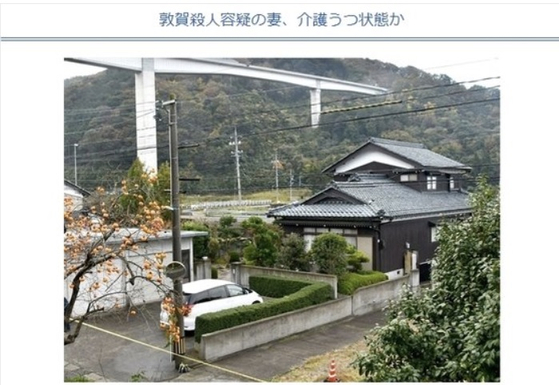“The defendant is sentenced to 18 years in prison.”
On the 5th, Judge Yoshinobu Kawamura of the Fukui District Court in Japan sentenced the white-haired defendant to the courtroom while in a wheelchair. The defendant’s name was Masako Kishimoto (72). He murdered his father-in-law Yoshio (93 at the time), mother-in-law Shinobu (at the time 95), and her husband Takio (at the time 70), on November 17, 2019 from 0 a.m. to 2 a.m.
Fukui Kishimoto ruled on the 5th of the murder case in 2019
Unusually low sentence for the murder of three
Daughter-in-law in 70’s, husband and wife in 90’s
The tragedy of’old age care’ for the elderly to care for the sick
![The house in Tsuruga City, Fukui Prefecture, where the murder of the Kishimoto family took place in November 2019. [사진 후쿠이신문 인터넷판 캡처]](https://i0.wp.com/pds.joins.com/news/component/htmlphoto_mmdata/202101/07/2d6da997-2398-4f06-9363-e8c7c6a6cc3f.jpg?w=560&ssl=1)
The house in Tsuruga City, Fukui Prefecture, where the murder of the Kishimoto family took place in November 2019. [사진 후쿠이신문 인터넷판 캡처]
On the 6th, the Asahi Shimbun conveyed the scene of the trial court on the day, saying that “the sentence is low on charges of killing three people.” This is because people who have killed several people in Japan are generally sentenced to life imprisonment or death. There were’special circumstances’ behind this ruling. It is a new social phenomenon that has emerged in Japan, a super-aged society, called’old-aged care (老老介護).
10 years of sick-in-law of mother-in-law… husband also collapsed
Nursing care (介護) in Japanese means’nursing and sick care,’ and’no-no care’ means that the elderly cares for and cares for the elderly. The same was the case with the Kishimoto family. Kishimoto, the daughter-in-law, has been caring for her sick father-in-law and mother-in-law alone 10 years before the two daughters left the house.
From 2016, the mother-in-law’s behavior became impossible at all, so they had to feed the two of them with liquid food and get urine. The mother-in-law is said to have told her daughter-in-law, “I want to die,” several times.
![An old man walking through an alley in Tokyo, Japan. [AFP=연합뉴스]](https://i0.wp.com/pds.joins.com/news/component/htmlphoto_mmdata/202101/07/4b15ed07-3aa4-4519-89b6-199d5808b8b0.jpg?w=560&ssl=1)
An old man walking through an alley in Tokyo, Japan. [AFP=연합뉴스]
There, even her husband, who runs a family business, collapsed from a cerebral infarction. The doctor said, “If it gets worse, it will be harder to move.” The laborious daily life of a grandmother in her 70s caring for three elderly people and handling company affairs continued.
According to the ruling, on the night of the incident, Kishimoto said to his father-in-law and mother-in-law, “I’m sorry, I’ll be there soon,” and then strangled them with a towel. He then said, “Let’s die together,” and killed her husband in the same way. He said to the investigator, “I hated the burden of putting my children on the burden of taking care of my husband when I died.”
Later, he left a letter of apology to his relatives and tried to kill himself by stabbing his stomach and legs with a knife, but he saved his life.
“I couldn’t have seen the exit”
According to the Asahi Shimbun, the court sentenced a relatively low sentence for the murder case, saying that “reflected the will of the bereaved family who did not want punishment.”
Her husband’s younger brother, who appeared at the trial earlier, said in the court, “The defendant took care of not only the care of the family, but also the accounting and cleaning of the company that his older brother ran,” he said. It was known that he said,
The wife of another younger brother of her husband also called for a sanction, saying, “My mother-in-law always said that she was’taking care of Masako’,” and “we should have noticed the difficulty of nursing sooner.”
The court also expressed its understanding of the situation in which the defendant was facing, saying in the ruling, “The defendant may have felt that he could not see the exit when his body was weakened. A burden that exceeded the defendant’s ability to cope”
However, he did not accept the defense attorney’s claim that “they were in a state of weakness in which they could not judge good or evil.
The tragedy that follows…”requires a support system”
Similar incidents have been happening in Japan since 10 years ago. In February 2013, a 96-year-old police officer strangled his 91-year-old wife, who he was caring for, in Nara Prefecture. In 2016, in Saitama Prefecture, an 83-year-old husband murdered a 77-year-old wife who had dementia.
Increasingly, there are more and more people suffering from the pain of caring, and the system they depend on is not yet in place. In an interview with Asahi, a jury in her 60s who participated in this trial said, “It depends on the availability of small help in the surroundings whether it causes an incident or not.” “I have to make it.”
Tokyo = Correspondent Lee Young-hee [email protected]
